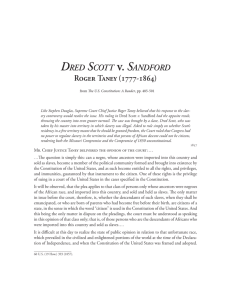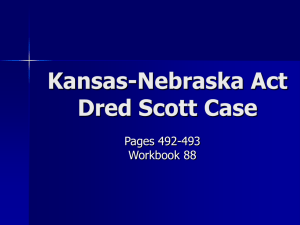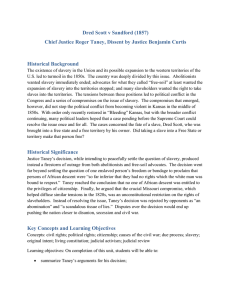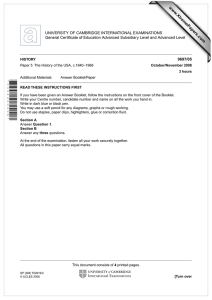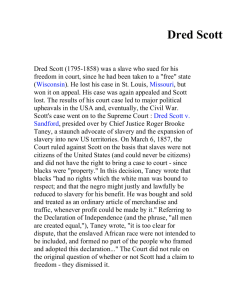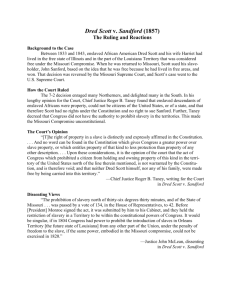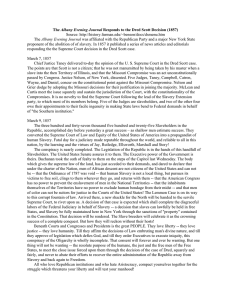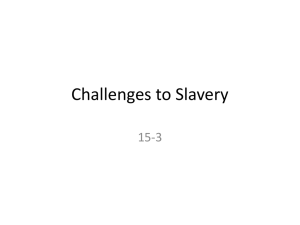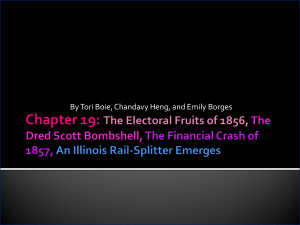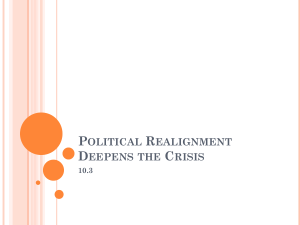Additional Lessons
advertisement
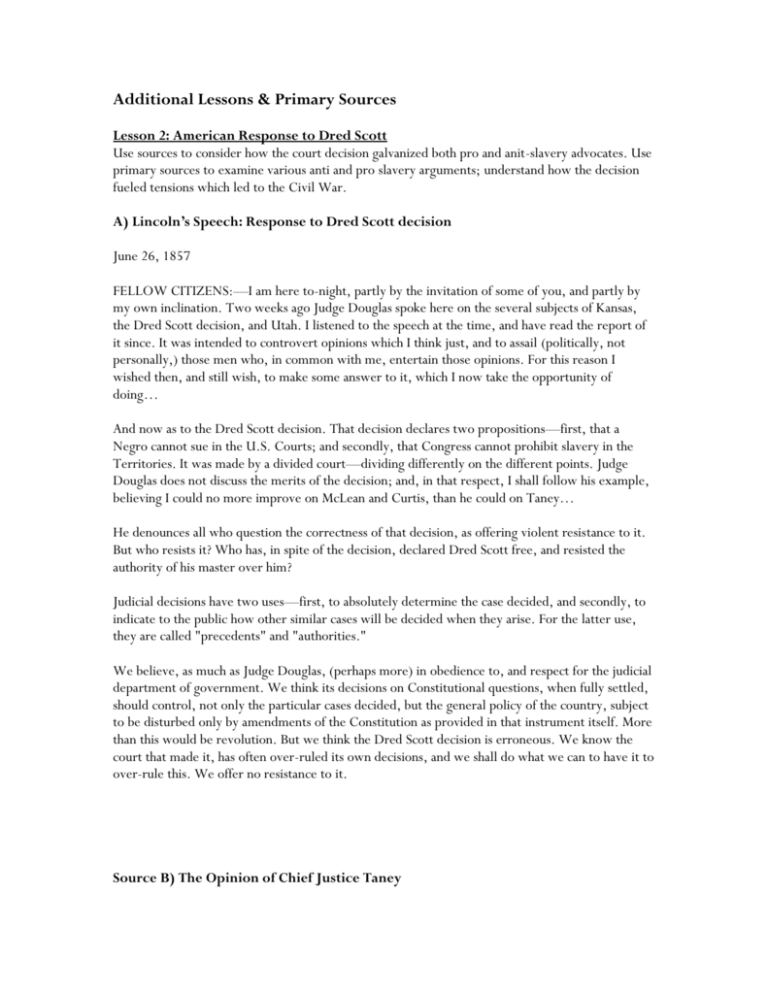
Additional Lessons & Primary Sources Lesson 2: American Response to Dred Scott Use sources to consider how the court decision galvanized both pro and anit-slavery advocates. Use primary sources to examine various anti and pro slavery arguments; understand how the decision fueled tensions which led to the Civil War. A) Lincoln’s Speech: Response to Dred Scott decision June 26, 1857 FELLOW CITIZENS:—I am here to-night, partly by the invitation of some of you, and partly by my own inclination. Two weeks ago Judge Douglas spoke here on the several subjects of Kansas, the Dred Scott decision, and Utah. I listened to the speech at the time, and have read the report of it since. It was intended to controvert opinions which I think just, and to assail (politically, not personally,) those men who, in common with me, entertain those opinions. For this reason I wished then, and still wish, to make some answer to it, which I now take the opportunity of doing… And now as to the Dred Scott decision. That decision declares two propositions—first, that a Negro cannot sue in the U.S. Courts; and secondly, that Congress cannot prohibit slavery in the Territories. It was made by a divided court—dividing differently on the different points. Judge Douglas does not discuss the merits of the decision; and, in that respect, I shall follow his example, believing I could no more improve on McLean and Curtis, than he could on Taney… He denounces all who question the correctness of that decision, as offering violent resistance to it. But who resists it? Who has, in spite of the decision, declared Dred Scott free, and resisted the authority of his master over him? Judicial decisions have two uses—first, to absolutely determine the case decided, and secondly, to indicate to the public how other similar cases will be decided when they arise. For the latter use, they are called "precedents" and "authorities." We believe, as much as Judge Douglas, (perhaps more) in obedience to, and respect for the judicial department of government. We think its decisions on Constitutional questions, when fully settled, should control, not only the particular cases decided, but the general policy of the country, subject to be disturbed only by amendments of the Constitution as provided in that instrument itself. More than this would be revolution. But we think the Dred Scott decision is erroneous. We know the court that made it, has often over-ruled its own decisions, and we shall do what we can to have it to over-rule this. We offer no resistance to it. Source B) The Opinion of Chief Justice Taney Albany New York, Evening Journal March 10, 1857 We print to-day a sophistical, dogmatic, muddy, and extreme Pro-Slavery document, which future historians will speak of as the present age speaks of the edicts of Jeffries and the Star Chamber. Unworthy of the Bench from which it was delivered, unworthy even of the previous reputation of the jurist who delivered it, unworthy of the American people, and of the nineteenth century, it will be a blot upon our National character abroad, and a long-remembered shame at home. It declares that the slaveholder may take his Slaves and hold them in any Territory under Federal control, and that neither Congress, nor the Territorial Government, nor the People, have the power now or hereafter to forbid him. It declares that the Constitution, though established "to secure Liberty," nowhere protects the existence of Freedom, and though it never mentions the word "Slave," everywhere legalizes Slavery! The monstrous absurdity of the argument, is only equalled by the astonishing revolution it seeks to effect in our jurisprudence. It falsifies the most reliable history, abrogates the most solemn Law, belies the dead and stultifies the living, -- in order to make what has heretofore been a local evil, hereafter a National institution! Source C) The Past and Future Charleston Mercury March 17 1857 …The Supreme Court of the United States, in a recent case, has, by a decision of seven to two of the Judges, established as law what our Southern statesmen have been repeating daily for many years on the floors of Congress, that the whole action of this Government on the subject of slavery, for more than a quarter of a century, from the initiation of the Missouri Restriction in 1822, to the California Compromise in 1850, has been all beyond the limits of the Constitution; was without justifiable authority; and that the whole mass should be now proclaimed null and void, and that slavery is guaranteed by the constitutional compact. …Now, however, we may congratulate ourselves that the highest tribunal has at last interposed and given its sanction to principles that recognize distinctly the equality of the States, and condemn the interference of the Federal Government with affairs that are peculiarly under their jurisdiction, and for interfering with which there is no warrant in our common Constitution, we cannot help feeling a sense of mortification that there has been so little of consistent union, on the part of the South, in the maintenance of principles on which depend absolutely her power, her industrial prosperity, and even her very existence. We might have made a better, as we might have made a more successful, battle in favor of interests so great and so vital. When all was at stake, we ought to have risked all, for the settlement of this question. What was it to us that there was a President to be elected, a Cabinet to be appointed, and a squad of subordinate officers to be placed or displaced. The sea is whitened with the rich freightage of our commerce, and the great country of our home is teeming with the abundant products of our peaceful industry. These are mighty interests, compared with which the shuffling game of politics is pitiful in the extreme; and these are the interests which we have too much allowed our public men to forget, or at least to make secondary to considerations of personal interest. Source D) The Decision of the Supreme Court. Raleigh, North Carolina, Standard 18 March 1857 We publish to-day, at length, the decision of the Supreme Court of the United States, delivered by Chief Justice Taney, in the Dred Scott case. The black Republicans of the North, and their allies in the South, may lament again and again the passage of the Nebraska-Kansas act, and the repeal of the Missouri restriction; but the whole question has been settled by the highest judicial tribunal in the country, and from this decision there can be no appeal. Abolitionism has been stunned, faction and treason in both sections of the Union have been rebuked, and the Constitution has been restored. This decision concedes to the Southern people all they have ever asked -- the Constitution. If true to themselves, they will never take any thing less. In our next we will publish the dissenting opinions of Judges McLean and Curtis, so that our readers may see for themselves the grounds occupied on both sides. This decision of the Supreme Court will be often referred to in discussion hereafter, and is of the first importance to the South; and we therefore suggest to our readers that they preserve the copy of the paper containing it. Additional Newspaper Accounts: http://history.furman.edu/editorials/see.py?menu=dsmenu&location=%3E%20Dred%20Scott% 20Decision Lesson 3: Dred Scott and the Question of Citizenship Compare Taney’s excerpt, Frederick Douglass’s Response to the decision and the Declaration of Independence to compare notions of citizenship and equality. This lesson focuses on Taney’s racial definition of citizenship. Source A) Excerpts from Taney’s decision in Dred Scott v. Sanford (1857) In the opinion of the court, the legislation and histories of the times, and the language used in the Declaration of Independence, show, that neither the class of persons who had been imported as slaves, nor their descendants, whether they had become free or not, were then acknowledged as a part of the people, nor intended to be included in the general words used in that memorable instrument. It is difficult at this day to realize the state of public opinion in relation to that unfortunate race, which prevailed in the civilized and enlightened portions of the world at the time of the Declaration of Independence, and when the Constitution of the United States was framed and adopted. But the public history of every European nation displays it in a manner too plain to be mistaken. And in no nation was this opinion more firmly fixed or more uniformly acted upon than by the English Government and English people. They not only seized them on the coast of Africa, and sold them or held them in slavery for their own use; but they took them as ordinary articles of merchandise to every country where they could make a profit on them, and were far more extensively engaged in this commerce than any other nation in the world. The opinion thus entertained and acted upon in England was naturally impressed upon the colonies they founded on this side of the Atlantic. And, accordingly, a negro of the African race was regarded by them as an article of property, and held, and bought and sold as such, in every one of the thirteen colonies which united in the Declaration of Independence, and afterwards formed the Constitution of the United States. The slaves were more or less numerous in the different colonies, as slave labor was found more or less profitable. But no one seems to have doubted the correctness of the prevailing opinion of the time. We refer to these historical facts for the purpose of showing the fixed opinions concerning that race, upon which the statesmen of that day spoke and acted. It is necessary to do this, in order to determine whether the general terms used in the Constitution of the United States, as to the rights of man and the rights of the people, was intended to include them, or to give to them or their posterity the benefit of any of its provisions. The language of the Declaration of Independence is equally conclusive: It then proceeds to say: "We hold these truths to be self-evident: that all men are created equal; that they are endowed by their Creator with certain unalienable rights; that among them is life, liberty, and the pursuit of happiness; that to secure these rights, Governments are instituted, deriving their just powers from the consent of the governed." The general words above quoted would seem to embrace the whole human family, and if they were used in a similar instrument at this day would be so understood. But it is too clear for dispute, that the enslaved African race were not intended to be included, and formed no part of the people who framed and adopted this declaration; for if the language, as understood in that day, would embrace them, the conduct of the distinguished men who framed the Declaration of Independence would have been utterly and flagrantly inconsistent with the principles they asserted; and instead of the sympathy of mankind, to which they so confidently appeared, they would have deserved and received universal rebuke and reprobation. Yet the men who framed this declaration were great men -- high in literary acquirements -- high in their sense of honor, and incapable of asserting principles inconsistent with those on which they were acting. They perfectly understood the meaning of the language they used, and how it would be understood by others; and they knew that it would not in any part of the civilized world be supposed to embrace the negro race, which, by common consent, had been excluded from civilized Governments and the family of nations, and doomed to slavery. They spoke and acted according to the then established doctrines and principles, and in the ordinary language of the day, no one misunderstood them. The unhappy black race were separated from the white by indelible marks, and laws long before established, and were never thought of or spoken of except as property, and when the claims of the owner or the profit of the trader were supposed to need protection. Upon the whole, therefore, it is the judgment of this court, that it appears by the record before us that the plaintiff in error is not a citizen of Missouri, in the sense in which that word is used in the Constitution; and that the Circuit Court of the United States, for that reason, had no jurisdiction in the case, and could give no judgment in it. Source B) Frederick Douglass Responds to Dred Scott May 1857 ..This last settlement must be called the Taney settlement. We are now told, in tones of lofty exultation, that the day is lost all lost and that we might as well give up the struggle. The highest authority has spoken. The voice of the Supreme Court has gone out over the troubled waves of the National Conscience, saying peace, be still. This infamous decision of the Slaveholding wing of the Supreme Court maintains that slaves are within the contemplation of the Constitution of the United States, property; that slaves are property in the same sense that horses, sheep, and swine are property; that the old doctrine that slavery is a creature of local law is false; that the right of the slaveholder to his slave does not depend upon the local law, but is secured wherever the Constitution of the United States extends; that Congress has no right to prohibit slavery anywhere; that slavery may go in safety anywhere under the star-spangled banner; that colored persons of African descent have no rights that white men are bound to respect; that colored men of African descent are not and cannot be citizens of the United States… The Supreme Court of the United States is not the only power in this world. It is very great, but the Supreme Court of the Almighty is greater. Judge Taney can do many things, but he cannot perform impossibilities. He cannot bale out the ocean, annihilate the firm old earth, or pluck the silvery star of liberty from our Northern sky. He may decide, and decide again; but he cannot reverse the decision of the Most High. He cannot change the essential nature of things--making evil good, and good evil. Happily for the whole human family, their rights have been defined, declared, and decided in a court higher than the Supreme Court. "There is a law," says Brougham, "above all the enactments of human codes, and by that law, unchangeable and eternal, man cannot hold property in man." Your fathers have said that man’s right to liberty is self-evident. There is no need of argument to make it clear. The voices of nature, of conscience, of reason, and of revelation, proclaim it as the right of all rights, the foundation of all trust, and of all responsibility. Man was born with it. It was his before he comprehended it. The deed conveying it to him is written in the center of his soul, and is recorded in Heaven. The sun in the sky is not more palpable to the sight than man’s right to liberty is to the moral vision. To decide against this right in the person of Dred Scott, or the humblest and most whip-scarred bondman in the land, is to decide against God. It is an open rebellion against God’s government. It is an attempt to undo what. God has done, to blot out the broad distinction instituted by the Allwise between men and things, and to change the image and superscription of the everliving God into a speechless piece of merchandise.
